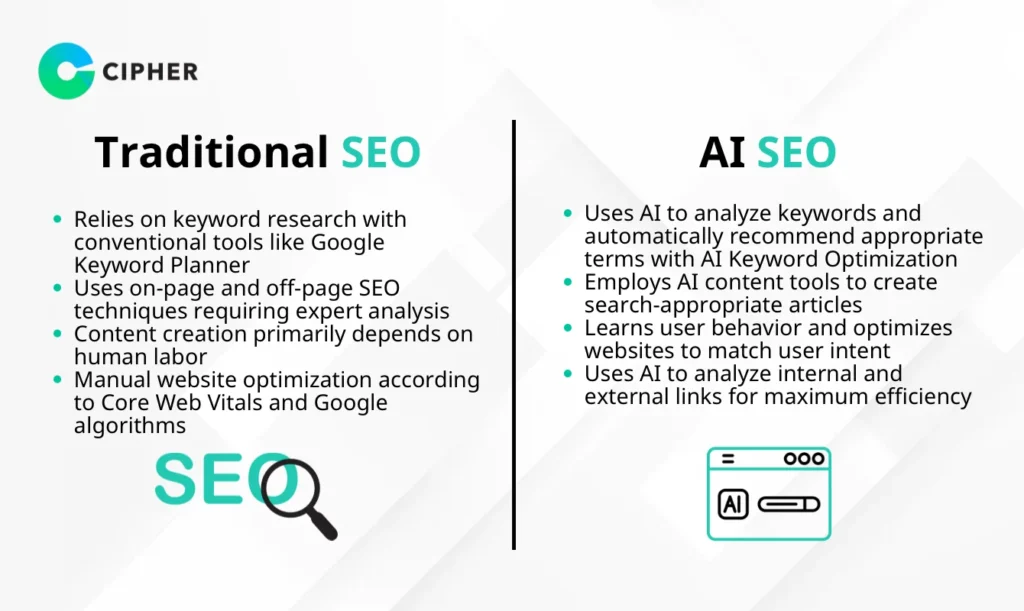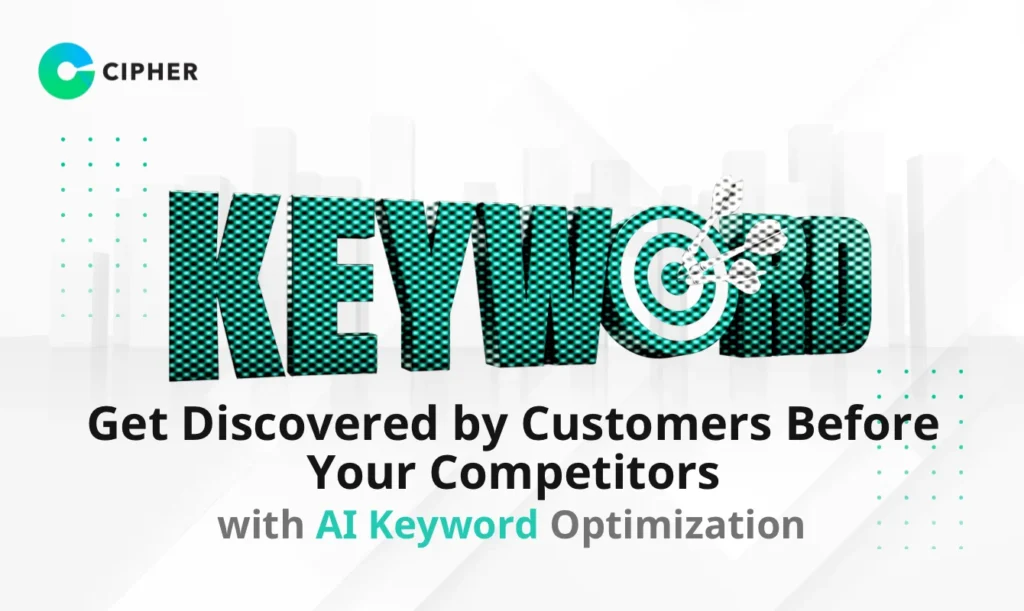Competition in the online world of 2025 is intensifying daily as more businesses enter digital platforms. The crucial question is: how do you ensure customers find your website before your competitors? The answer lies in combining robust SEO strategies with AI Keyword Optimization to enhance search efficiency. Today, we’ll explore how to use AI Keyword Optimization techniques that will help your business rank on search engines and stand out in results, whether on Google Search or AI Search platforms like ChatGPT, Claude, and Gemini.
Table of Contents
Modern SEO and the Changing Role of AI

Many wonder if SEO with AI remains important when AI Search has become part of daily life. The answer is “very important, and adaptation is essential!”
Recent data shows that 68% of online purchases begin with a Google search, but only 0.78% of users click through to page 2 results. This highlights why AI Keyword Optimization to secure first-page rankings is crucial in online business competition.
While AI Search platforms like ChatGPT, Claude, or Gemini have somewhat altered consumer search behavior, Google still dominates the search market in Thailand with 97.11% market share according to 2024 data, while Bing—ChatGPT’s primary data source—holds just 1.64%. To successfully rank on search engines in this environment, businesses must adapt their strategies.
Understanding the Difference Between Google Search and AI Search
To better understand the landscape, let’s examine the differences between traditional search and AI Search:
- Google Search: Displays links to websites where users can click to find answers.
- AI Search: Provides direct answers in conversational format, drawing from learned databases without requiring users to visit multiple websites.
It’s important to note that AI Search platforms like ChatGPT pull some data from Bing, Microsoft’s search engine. This means that optimizing your SEO for both Google and Bing is the starting point for getting your information to appear in AI Search results, making AI Keyword Optimization essential.
What is AI-SEO? Why Use It in 2025?
SEO AI, or Artificial Intelligence Search Engine Optimization, uses artificial intelligence to analyze, adjust, and enhance websites to align with search engine algorithms. AI has become crucial in SEO processes, including keyword analysis, content creation, and website optimization. Using AI content tools has revolutionized how businesses approach their digital marketing strategy.
A HubSpot report reveals that 54% of SEO specialists leverage AI in their work, and Google generates AI answers for 8.71% of all keywords. Detailed searches using ten search terms are 19.10% more likely to trigger AI overview displays. This explains why AI Keyword Optimization is highly popular in 2025 for businesses looking to rank AI content effectively.
The Difference Between AI-SEO and Traditional SEO

SEO AI and traditional SEO differ significantly in several aspects:
Traditional SEO:
- Relies on keyword research with conventional tools like Google Keyword Planner
- Uses on-page and off-page SEO techniques requiring expert analysis
- Content creation primarily depends on human labor
- Manual website optimization according to Core Web Vitals and Google algorithms
SEO with AI:
- Uses AI to analyze keywords and automatically recommend appropriate terms with AI Keyword Optimization
- Employs AI content tools to create search-appropriate articles
- Learns user behavior and optimizes websites to match user intent
- Uses AI to analyze internal and external links for maximum efficiency
Understanding User Personas in the AI Search Era
Main Persona Groups in the AI Search Era
1. Traditional Searchers
- Behavior: Primarily use Google Search, prefer clicking through multiple websites, comparing information themselves
- Age Range: Often Gen X and Baby Boomers (40+ years)
- SEO Strategy: Focus on traditional SEO, emphasize On-Page SEO, attractive Meta Descriptions, and clear CTAs
- Keywords: Typically use short keywords or basic search terms
2. AI Embracers
- Behavior: Use both Google Search and AI Search like ChatGPT interchangeably, depending on the type of information needed
- Age Range: Often Millennials (25-40 years)
- SEO Strategy: Blend traditional SEO with AI Keyword Optimization to rank on both Google and AI Search
- Keywords: Use both common keywords and sentence-form questions
3. AI Natives
- Behavior: Primarily use AI Search, prefer quick convenience in getting answers, don’t want to spend time comparing information from multiple sources
- Age Range: Often Gen Z (under 25 years)
- SEO Strategy: Full focus on AI-SEO, create content with clear, concise, and comprehensive answers
- Keywords: Often use sentence-form questions or conversational keywords
4. Specialty Seekers
- Behavior: Seek specialized in-depth information, often use both Google Search and AI Search to verify information accuracy
- Age Range: Various age ranges, depending on industry expertise
- SEO Strategy: Focus on creating in-depth content, demonstrating expertise, and intensive use of E-E-A-T Factor
- Keywords: Prefer Technical Keywords and specific Long-tail Keywords
Adjusting AI Keyword Optimization by Persona
Understanding different personas helps you implement effective AI Keyword Optimization strategies:
- Create diverse content: Cover both in-depth content for Traditional Searchers and direct-answer content for AI Natives
- Use varied keywords: Combine common keywords and sentence-form questions to cover all search patterns
- Adjust website structure: Make content easily accessible and understandable for AI while maintaining good UX for general users
- Address specific needs: Analyze pain points for each persona and create content that directly solves these problems
Understanding these different personas helps you create comprehensive and effective AI-SEO strategies, making your website visible to target audiences of all types, whether they use Google Search or AI Search.
Which Keywords Does AI Prefer? Analyzing New-Era Search Behaviors
Keywords that trigger AI Overviews change rapidly. According to Search Engine Journal, keyword trends can shift significantly each month, so AI Keyword Optimization must constantly adapt.
In June 2024, keywords containing “best” triggered AI Overviews up to 50% more frequently, but Google may have adjusted this behavior the following month. This illustrates why keeping up with AI-SEO trends is essential.
Questions That Trigger AI Overviews in 2025:
Analysis shows these question formats are more likely to trigger AI Overviews, which is important information for AI Keyword Optimization:
- “What is” questions increased by 20%
- “How to” questions increased by 15%
- Questions with the phrase “symptoms of” increased by approximately 12%
- Questions with the word “treatment” increased by 10%
Interestingly, specific long-tail keywords, despite low search volume, often trigger AI Overviews more effectively. AI Keyword Optimization techniques should prioritize these types of keywords to help rank on search engines successfully.
How to Optimize Content for Google Search Generative Experience (SGE)
SGE is Google’s new feature that uses AI to create search results that summarize information more closely aligned with user needs. Adapting content to support SGE through SEO AI is therefore essential for businesses wanting to rank on search engines effectively.
Strategies to Optimize Content for SGE:
To have your content selected for display in SGE, follow these AI Keyword Optimization guidelines:
- Create comprehensive content – Content should be thorough and answer user questions as completely as possible
- Use natural and concise language – Use easy-to-read, uncomplicated language that focuses on providing direct information
- Use appropriate structure – Divide content into sections using H1, H2, H3 to help Google’s AI better understand the context
- Enhance E-E-A-T – Build credibility by demonstrating Experience, Expertise, Authority, and Trustworthiness in your content
Natural Language Processing (NLP) Techniques That Help AI Better Understand Content
NLP is technology that helps AI better understand human language, significantly impacting AI-SEO. Try these techniques to enhance AI Keyword Optimization:
- Using Long-tail Keywords – AI better understands search context when natural keywords are used
- Using Question-Based Content – Google prefers to display content that directly answers user questions
- Using JSON-LD Schema Markup – Helps Google’s AI better understand website information, such as articles, reviews, and product information
- Adding Context Through LSI Keywords – Use terms related to main keywords to help AI better understand content meaning
How to Increase Your Brand's Visibility on ChatGPT or AI Search?
Making your brand discoverable and visible in AI Search results through Generative Engine Optimization (GEO) is no longer difficult with AI Keyword Optimization techniques.
The key is creating Digital PR articles and strong AI-SEO. Since AI Search platforms like ChatGPT primarily draw information from Bing, if your business wants AI to display information from your website, you need to create quality content that ranks well on both Google and Bing. Many businesses are now learning how to increase sales with AI SEO by implementing these advanced techniques.
Check if People Are Finding Your Website on AI Search
Currently, there are tools to help you track how much your brand is mentioned in AI Search, which is an important part of AI Keyword Optimization:
- AI Search Tracker: Helps track searches through ChatGPT, Gemini, and Perplexity
- AI Traffic: Shows data about website traffic coming from AI Search
- Brand Radar from Ahrefs: Provides insights about AI searches
ASEO: SEO Strategy Adapted for the AI Era
The ASEO Model is divided into 3 main components:
- Content Strategy: Plan content to address both users and AI
- Site Trustworthiness: Build website credibility
- Site Experience Quality: Develop good user experience
These 3 components can be further divided into 7 sub-factors, from the foundation to the pyramid peak, which are the heart of AI Keyword Optimization:
- Keyword & Search Intent: Understand different user intentions
- High Quality Content: Create content according to E-E-A-T Factor
- Silo-based structure: Systematically connect Internal Links
- Link Building: Focus on quality over quantity
- External Signals: Use Google Business Profile, Social Media, and others
- Search Experience Optimization (SXO): Adjust UX/UI to keep users on your page longer
- Technical Issues: Correctly and promptly address technical problems
AI Tools for SEO
Basic Tools You Should Use:
- Google Search Console and Google Analytics 4: Free and provide direct information from Google
- SEMrush or Ahrefs: Detailed Keyword and Backlink analysis
- Screaming Frog: Crawl websites to find Technical SEO Issues
AI Content Tools for SEO:
AI technology makes SEO with AI more efficient, saves time, and reduces workload. Try these tools to enhance AI Keyword Optimization:
- Gemini: Helps find keywords and create SEO content
- Surfer SEO: Analyzes content compared to top-ranking websites
- Frase: Helps adjust SEO content, write headlines, and structure content
- Clearscope: Enhances content quality through in-depth keyword analysis
However, AI content tools should be used alongside traditional SEO skills, and you should study how to use these tools thoroughly before implementation. The right combination will help you rank on search engines much more effectively.
AI Keyword Optimization Services from CIPHER
At CIPHER, we offer comprehensive AI Keyword Optimization services to help your business rank on Google’s first page and increase discovery chances through AI Search:
AI-Powered Keyword Research
AI Search Visibility Analysis
AI-Enhanced Content Creation
Technical SEO Optimization
ASEO Strategy Development
Ongoing Optimization & Monitoring
Conclusion
While AI Search changes how we search for information, SEO AI remains important and must adapt to technology. In 2025, AI Keyword Optimization is essential because it helps analyze keywords, create content, and optimize websites, giving businesses an advantage over competitors. The key is balancing AI technology with quality content that addresses user needs, as both Google and AI Search aim to deliver the best experiences. Using AI content tools properly can significantly improve your ability to rank on search engines. Contact CIPHER at 081-633-3636 to elevate your SEO in the AI era!





